- Home
- David Adams
The Soul Sphere: Book 02 - The Final Shard Page 2
The Soul Sphere: Book 02 - The Final Shard Read online
Page 2
On the third day since they had parted from Lucien and Alexis, the forest turned sharply east, and Demetrius and Corson knew it was time to take their leave. They wanted to pass around the west end of the Stone Mountains, which formed part of the border between the Westerland and Corindor, and moving east from where they were now would only extend their trip. The others would continue to follow the forest until they reached the foothills of the Trawnor Mountains, at which time they planned to move south past the Trawnor and Aetos, and then head east again, where they could reach Ridonia and Delving. Again farewells and sincere wishes of good luck and Godspeed were exchanged, and the party split once more.
Chapter 2: New Allies and Lost Friends
At the same time their former companions were taking their leave of one another, Lucien and Alexis neared Lumia, the capital city of Lorgras. Alexis found Lucien to be a good traveling companion for the most part, alert to danger, a quick and effective hunter, respectful and quiet. It was in this last respect, normally something she considered a positive, that she found herself missing the rest of the former party, Corson in particular with his jovial wit. The goblin’s general reluctance to carry on a lighthearted conversation left her with more time than she wanted alone with her own thoughts, which drifted always to fears about what had and would happen to her land and her people. Nearing Lumia, she was hesitant to look up and see the city that had once been the seat of her power. And it was now that the normally silent goblin spoke, a few words only, but enough to force her to face current reality.
“There it is,” he said.
The city was little changed from when she had last seen it, one long glance as she had departed some five months previous. The once great walls were crumbled in most places, cracked and scarred in others. The city’s tallest buildings were gone, smashed to rubble by the Dead Legion, and the lesser buildings that remained were either burned out or damaged. Little had been done to start rebuilding while she was gone, but that was no surprise. As long as the Legion prowled the land, rebuilding would only give them a fresh target.
“Keep your weapon sheathed unless I say otherwise,” Alexis said.
“I understand.”
They approached the city’s ruins slowly, Alexis leading. The footfalls of their horses echoed off the rubble as they passed through the shattered city gate.
“Halt!” cried a voice from some distance ahead. They reined up their horses. Suddenly, as if materializing out of the broken stones and burned timber, a group of female warriors surrounded them. The one who had issued the first challenge stepped forward, the hardness in her features melting away as she recognized her queen.
“Alexandra!” she exclaimed, breathless. Her eyes turned to the goblin and further words failed her.
“It is all right,” Alexis said. “He quests with me.”
“The others?” someone asked.
Alexis looked back and recognized the questioner, Collinda by name, not a woman full grown yet, but one wearing the garb of a warrior. Such was the way of things now that so many had fallen. Alexis remembered that Collinda's older sister had been in her original party. “I’m sorry. She fought bravely but fell. She died with dignity.”
Collinda nodded once, sharply, and refused to let any feelings she might have at the news of her sister’s death show through her warrior’s façade.
“I have much to tell, and to ask,” said Alexis, addressing the group. “Have as many senior warriors as possible gather where the Great Hall once stood in the hour after sunset.”
The sentries bowed and scattered to spread the word that the queen had returned, while Alexis and Lucien toured the once great city.
They took dinner from their own supply of food, knowing those left in the city could spare little of what they had, though they were quick to offer it. Only the barest outline of the Great Hall was left standing—they entered by stepping over the low line of stones rather than needing to find a door. Some thirty female warriors awaited them, and as they saw their queen, the darkness that had settled on their hearts lifted, if only for a shining moment. As much as they wanted to rush forward to greet her, the goblin at her side was a reminder of how much the world had changed.
Alexis told her tale to a rapt audience, her eyes moistening only once—when she told of her fellow Lorgrasians falling in the tunnel under the Stone Mountains. But hope swelled as the story progressed, and when she finished with the plan to assault Veldoon, her warriors were ready to go.
“We can march in two days,” Delona said, to murmurs of approval. “Sooner if necessary.”
Alexis smiled. “I don’t doubt it. But we have time to prepare, while the other armies are gathered. Now tell me of what has happened here while I was away.”
They spoke in turns, relating how the people had scattered, as ordered, and that the Legion had not been seen in force since Lumia was sacked, although rumors of dark creatures prowling the land were rampant. Food had been well-guarded and rationed, such that the winter, though harsh, did not see them starve. The warriors had set up a loose but effective chain of communication, such that they could move themselves or the people in a coordinated fashion on short notice.
“You have done well,” Alexis commended them, obviously pleased. “As I knew you would.”
The fire sputtered and cracked, its thin smoke wafting up toward the stars. Alexis gazed into the flames for a moment as if trying to divine the future. “Delona, you will see that we are ready to march in six weeks. Carlend and Myrna will see to gathering and transporting food and supplies. Have the craftspeople fashion as many weapons and shields as they can. There should be plenty of raw material in our ruined cities that can be used.
“That is so,” said Myrna, “but our warriors are all equipped already. The craftspeople have not been completely idle.”
“That is to their credit, but I want to be sure the men and boys are armed as well.”
“To defend Lorgras while we are away?” asked Delona. “We might do better leaving a small group of warriors behind.”
“A small group will be left to defend the sick and the very old and young. The able-bodied men and boys march with us to Veldoon.”
Harsh whispers passed through the gathered warriors, a muted protest. Delona opened her mouth to speak, then thought better of it.
“Go on Delona,” Alexis said. “Best discuss it in the open, rather than swallowing it. You will likely speak for many.”
“Men and boys have never been trained to fight. It is not our way.”
“It is not,” Alexis agreed. “But much has changed in Arkania. We need everyone who can fight to do so. Even then, it may not be enough. You said the army could be ready to march in two days. What I need is for the training to begin then. This way we will not be so green when the time comes to fight.”
“As you wish, Alexandra.” She paused and then added, “There are many who might refuse to fight next to or lead men in battle.”
“Then I will lead the men myself when I return.”
“Return? You depart again so soon?”
“I must go to Western City to convince Duke Fallo to join us, and before that to Lucien’s land, where he will gather the goblin army.”
“The Shadowlands? Surely you cannot travel unescorted there.”
“I be with her,” Lucien said.
Delona measured her words, trying not to offend the goblin. “I’m sure you are a brave warrior, but what could you do if a group of goblins decided to attack the queen?”
“As much as I could do if this group decided to attack him,” Alexis replied. “We have faced grave perils together before, and will again. The Shadowlands are the least of my worries, and I would rather travel there with a goblin than a score of Lorgrasian warriors. Sometimes a single companion brings safety where a thousand weapons could not.”
Delona bowed stiffly. “I only fear for your safety, my queen.”
Alexis lifted the other woman’s chin. “I know, and I am grateful. But
we all have tasks we need to accomplish. I will stay through tomorrow to give what aid and direction I can, but the next morning we must be away.”
They argued no more, but the night seemed heavier and darker. A few lighter tales brought smiles and soft laughter, but soon Alexis had to beg her leave, as reticent as she was to do so. The journey had been long, and the tasks ahead were arduous. Feeling the exhaustion she had denied for weeks, two nights and a day of rest seemed far too short.
* * *
Demetrius pulled back on his horse’s reins to call him to a halt. As the horse stilled, Demetrius closed his eyes, letting the gentle, warm breeze wash over him. They had traveled four days since departing from Tala and Rowan, going almost directly south, and winter seemed to recede before them like an ebb tide. The snow on the ground had vanished and while their cloaks were still needed at night, they were packed away during the day. The sun warmed Demetrius’ face, and he could imagine that he caught a scent of spring in the air. He let his reverie stretch out a few minutes, then opened his eyes, the sallow look of the ground confirming that the warmth and the breeze were no sure harbingers of a glorious spring and of new life. The seasons would change, regardless of Solek’s magic, but whether or not flowers could bloom and crops would grow was a matter worthy of some debate. He snapped the reins and caught up to Corson.
“Thinking?” his younger friend asked.
“Not really. Enjoying the sun and the wind for a moment.”
“It is far more pleasant than the dead of winter; that much can’t be denied.”
The horses trotted onward at a good, steady pace, their hooves thudding softly in the long grass. For some stretches of their journey it was the only sound.
“It is too quiet here,’ Demetrius commented. “Even for open land.”
“Better than having a thousand Legion warriors at our backs.”
“That’s not what I meant. The animals are too few and far between. This area is mostly wilderness.”
“We took two rabbits yesterday, and a deer the day before. Small, yes, but—”
“But there has been little else, except for the things that prowl at night, either in the grass or the trees. And I don’t think those are wolves or foxes. It is something foreign to these parts.”
“Such as?”
“I don’t know. But it feels wrong, just like the land. Like poison or an infection. It’s as if the things that remain hidden away in the dark places are slowly edging into the light.”
Corson finished the thought. “While the people and common animals go into hiding.”
Demetrius saw from the look on his friend’s face that he understood. He nodded solemnly.
“Are you worried about what we’ll find back home?” Corson asked.
“Yes.” The answer was stark and cold, though there was neither bitterness nor fear behind the word. Demetrius did not waste time mincing words, especially with those he trusted and cared for. Corson had always taken what some perceived as brusqueness as a personal compliment.
That night they huddled close to the fire and kept the horses close as well—they had taken three. As much as they wanted to rest, they knew they had to keep a watch through the night. They had just finished a modest supper and were reminiscing about years gone by when Demetrius suddenly held up a finger.
“Is it back?” Corson whispered.
Demetrius nodded, then motioned with his head to Corson’s right.
The moon was just shy of full, and it cast a ghostly blue light over the landscape. Some fifty yards off, the grass rustled gently as something slithered through it in short, quick rushes. As it closed to thirty yards, the horses whickered, sniffing at the air. The grass grew still but for the subtle, breeze-driven waves that constantly stirred it.
Demetrius held up an open hand so that Corson would stay where he was, then slipped silently away from the fire. Carefully he circled around to where their visitor had last been spotted. Before he was halfway there it made its move, darting forward.
Corson rose up and unsheathed his sword in one motion. If the thing was coming for him it recognized the weapon and the act of preparation. It sprang sideways at one of the now terrified horses. The steed took the initial blow easily—its attacker was far smaller than it was, no more than four feet in length and two in height—and spun away, pulling on the rope that held it to the other mounts. The three horses had started in opposite directions and the rope had negated their attempts to flee.
Before the creature could fully recover Demetrius and Corson were upon it. Demetrius’ sword cracked against a chitinous plate, which absorbed the blow with a loud crack. A claw-like appendage swatted at the sword, while a dozen legs scrambled for purchase on the ground. After fixing Demetrius with its black, soulless eye, the thing sprang away, quickly vanishing into the night.
Demetrius watched it go—although there was nothing to see after a couple of seconds—while Corson calmed the horses. After the horses were settled, Corson moved beside his friend.
“Any idea what that was?” he asked.
“No,” said Demetrius. “And that bothers me a great deal.”
* * *
Rowan gazed through a light morning fog while dawn broke in the east. He could just make out the outlined peaks of the Trawnor Mountains in the distance, although the foothills were still shrouded.
“I don’t like fog,” he said, speaking to himself. “Makes it hard to see where you’re going and what’s coming at you.”
Tala overheard him. “Nothing for it but to press on. It will lift soon enough.”
“I know. But it’ll slow us down until then.”
They picked their way carefully south, the Great Northern Forest at long last receding behind them. They had traveled within sight of it for a full week since their separation from Demetrius and Corson, and the whole group had used it as a guide for nearly a fortnight before that. It was a parting utterly devoid of sorrow. The woods remained as dark and foreboding as ever, and at night shadows eyed them from just inside the tree line, and of late from beyond it. There had been no attacks, but the horses had been nervous and jittery, and Rande now carried Jazda’s extra knife—just in case.
Jazda was a jovial enough companion, but the boy was quiet and detached. He spoke when spoken to, and helped with building fires and tending the horses, but he rarely smiled or laughed. This morning he had taken his usual spot in line behind Jazda, and seemed content to study his mount’s mane. Tala gave her horse a little kick and moved up beside him.
“Sleep well?” she asked.
He nodded in reply.
“How long have you sailed with Captain Jazda?”
“Since I was eight or nine.”
“Your parents?”
“My mother had seven kids. Never knew my father. She couldn’t feed us all—not easily anyway. So I found work.”
“Do you like it? Life at sea, I mean.”
“I’m good enough at it, I suppose.”
“Ever think you might want to captain your own ship someday, when you are a bit older?”
He fixed her with a quick, piercing stare, then turned away again. “I don’t think I’ll be seeing ‘older.’ Even if I do, it’ll be living under a rock, trying to avoid the Legion—or worse things.”
Tala was so taken aback by his words that she had to clear her throat before she could reply.
He smiled at her discomfort, without mirth. “I’m young, but my eyes still work. I can see what’s happening.”
“I have more hope than you, perhaps. For the future.”
“What would someone like me know of hope?” The question was a challenge.
“You have done better than most, faced with the choices you had. Captain Jazda thinks highly of you. The crew thought of you as one of their own.”
“And now they are all dead.”
“Yes,” said Tala, eyeing the boy. “But you are not. Do not act like you are.”
“I do my fair share.”
�
��I was not speaking of that, as you know. You have to decide whether to face the challenges life deals you by fighting on or by quitting. You do not strike me as being a quitter.”
Rande wore a sullen look. “I’m not.”
“No one has been exempt from pain. Your life has been harder than most, but you know you have a lot of company in hardship. And we have a chance—however slight—to change things for the better.”
“I hope you don’t think that little speech will suddenly have me giggling like a little girl and braiding flowers in my hair.”
“Hardly. But I would like to think you are not beaten already. Of course, that choice is up to you.”
Rande mulled that over for a bit. “So what makes you think happy thoughts all the time?”
Tala laughed. “I do not. Never have. My life had its own complications long before Solek raised his first army. But I know once I give up, he has won.”
“And what of this Savior Rowan speaks of?”
She shrugged. “I have seen the power of evil embodied. Why not good?”
“Doesn’t sound like he’s converted you.”
“He has not tried. It is not his way. I have only heard him try to answer your questions—I do not recall him preaching to you.”
Rande sighed. “He hasn’t, but he probably will soon enough. People all worship something—a god, money, themselves—and they want you to see the world the way they do.”
Tala shook her head. “There is some truth in that, but people are individuals. Some, like Rowan, will fight for what is right and good, with little thought of personal gain or loss. I think that is his most powerful testimony for his Savior. Try to see that part of the man, and then maybe you will recognize it in others and decide there is hope for Arkania—and that there is something here still worth fighting for.”
With that she fell back, allowing Rande to ponder what she had said.
That evening the adults sat around the fire while Rande busied himself with the horses. He found some solace there from his internal scars, and though he often lingered longer than necessary, they never called him away from the animals. It wasn’t as if he had a dozen chores to do anyway.

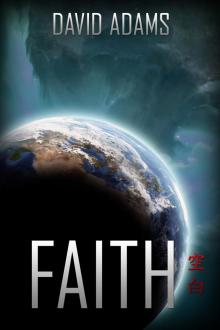 Faith
Faith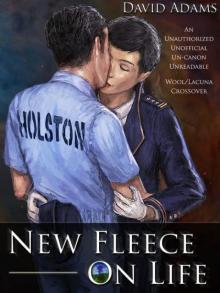 New Fleece on Life
New Fleece on Life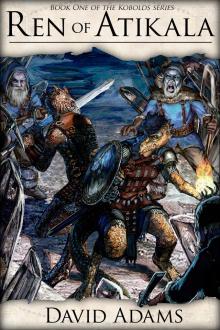 Ren of Atikala
Ren of Atikala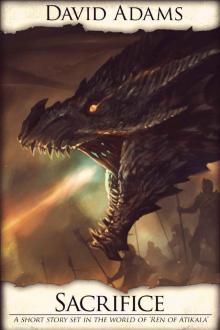 Sacrifice (Kobolds)
Sacrifice (Kobolds) Dusk
Dusk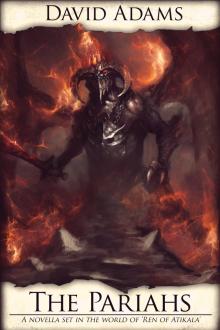 The Pariahs
The Pariahs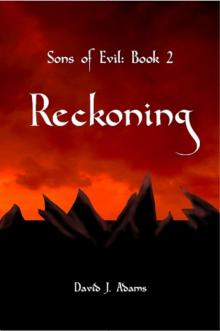 Reckoning
Reckoning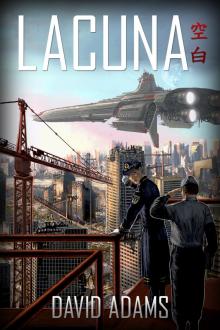 Lacuna
Lacuna Hammerfall
Hammerfall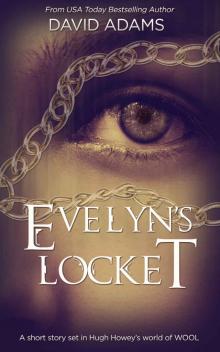 Evelyn's Locket
Evelyn's Locket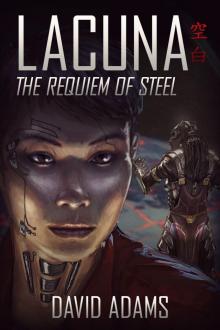 The Requiem of Steel
The Requiem of Steel Lacuna: Demons of the Void
Lacuna: Demons of the Void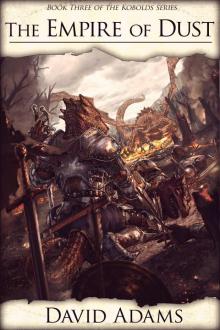 Ren of Atikala: The Empire of Dust
Ren of Atikala: The Empire of Dust The Soul Sphere: Book 02 - The Final Shard
The Soul Sphere: Book 02 - The Final Shard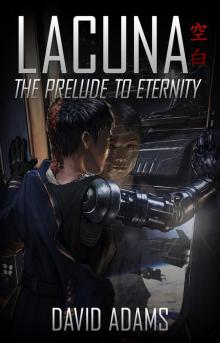 Lacuna: The Prelude to Eternity
Lacuna: The Prelude to Eternity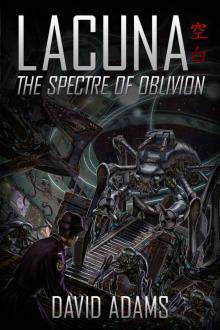 Lacuna: The Spectre of Oblivion
Lacuna: The Spectre of Oblivion Legacy Fleet: Hammerfall (Kindle Worlds) (Khorsky Book 1)
Legacy Fleet: Hammerfall (Kindle Worlds) (Khorsky Book 1) The Soul Sphere: Book 01 - The Shattered Sphere
The Soul Sphere: Book 01 - The Shattered Sphere Imperfect
Imperfect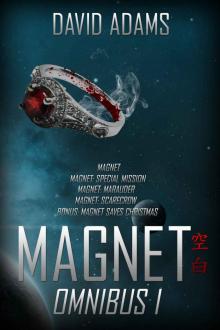 Magnet Omnibus I (Lacuna)
Magnet Omnibus I (Lacuna)